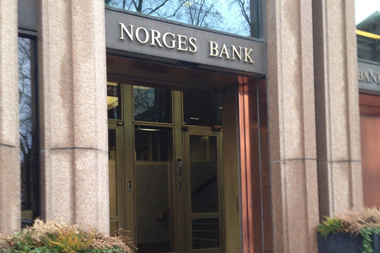Norway’s sovereign wealth fund has barred nine companies from even entering its portfolio despite being added to the index it follows, under a new pre-screening approach it hopes will add to financial returns in the long run, according to an announcement this morning.
Norges Bank Investment Management (NBIM), which runs Norway’s NOK12.4trn (€121bn) Government Pension Fund Global (GPFG), revealed that – as flagged up by NBIM chief executive officer Nicolai Tangen in May in a speech at a parliamentary hearing – it started new work in June to systematically assess the sustainability risk of companies due to enter the fund’s equity index.
Tangen said in a press conference from Oslo this morning: “So far this year we have assessed 442 companies, and we have decided to refrain from investing in nine of those companies.
“The idea is to weed out the companies we don’t want to be invested in, basically to keep the rotten apples out of the basket. In addition, it also gives us very good information on the sustainability risks in the companies we continue to be invested in,” he said.
NBIM said its analyses had uncovered risks related to inadequate management of environmental pollution and human rights, and that it had concluded these nine companies could add financial risk to the fund in the long term.
Tangen said the new pre-screening NBIM was doing built on the organisation’s “very solid work on ESG risk-based divestment”.
As the information available on these companies entering the SWF’s index was quite limited, he said it meant NBIM could still have companies with ESG risks coming into the fund, and that it would continue to monitor them through its normal ownership and risk-based investment work.
The names of the rejected stocks would not be disclosed, the CEO explained, because these decisions had been investment decisions.
“The divestments are risk-based divestments and they differ from the type of divestments we do on the basis of the Council on Ethics,” he said.
In addition to the nine companies spurned, Tangen said that since June, 65 companies entering the index had been passed on to its ownership department for a “more thorough ownership follow up going forward”.
Asked by IPE whether NBIM expected these pre-screening stock rejections to have a positive impact on financial returns of the GPFG in time, Patrick du Plessis, global head of risk monitoring, said: “Over the long-term, we believe they will reduce the risk in the fund.”
He said the pre-screening work was basically a carbon copy of the risk-based divestment work it had been doing since 2012, and that what was different was simply the point at which the divestment occurred, adding that NBIM’s risk-based divestment work had traditionally been profitable.
Tangen also said in response to the question: “We have said previously that we believe if you don’t have a sustainable business that in the longer term you will not get financing, you will not get insurance, you won’t have people working for you, you won’t have any clients. So we do think that these things increasingly go hand-in-hand.”
Since Tangen took over the leadership of NBIM just over a year ago, the organisation has announced a number of initiatives it plans to take to increase portfolio returns.
Although, according to the Ministry of Finance, the GPFG’s investment strategy is one that involves only “moderate scope for deviations from the benchmark index”, NBIM said in a letter to the ministry yesterday that the fund’s strategy was not a passive one.
“One important premise for the investment strategy is that the fund is to be managed close to the benchmark index. However, all of our investment strategies have active components,” NBIM said in the letter published yesterday, entitled: “Review of the management of the Government Pension Fund Global”.
“A strategy without active components – a passive strategy – would attempt to mimic the benchmark index by following set rules,” wrote Norges Bank governor Øystein Olsen and Tangen in the letter.
“We are of the opinion that such a strategy is not compatible with the investment strategy set by the Ministry or with the overall objective of the highest possible return after costs,” they said.
Since 1998 and the end of September 2021, NBIM said the fund’s annual excess return over the benchmark index had been 0.26 of a percentage point, including an annual excess return for equities of 0.44 of a percentage point.









